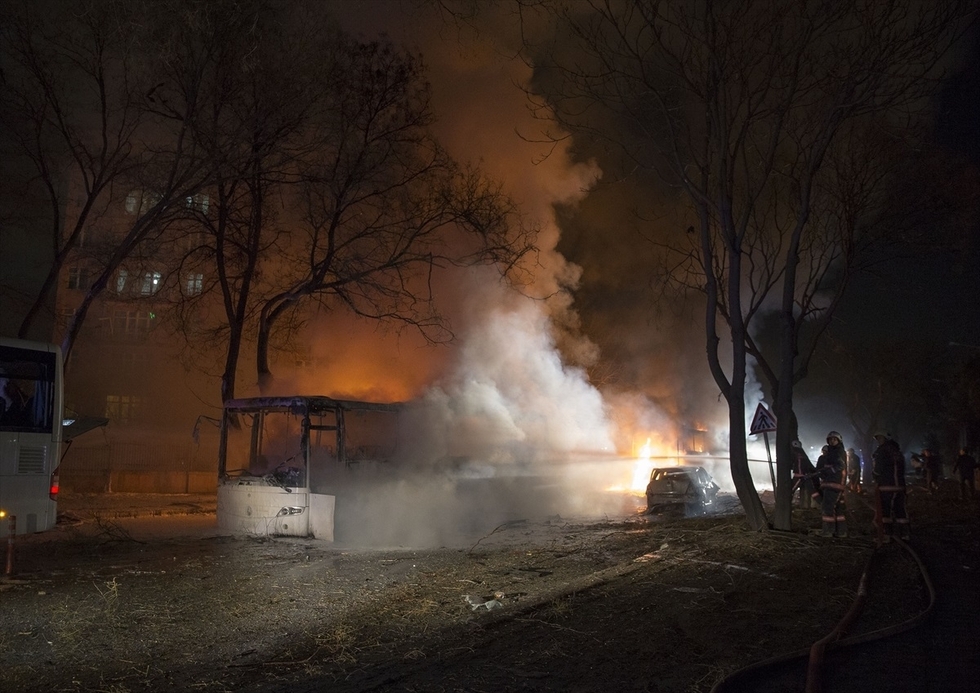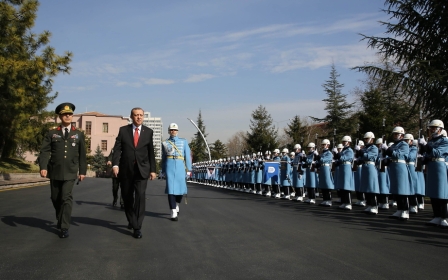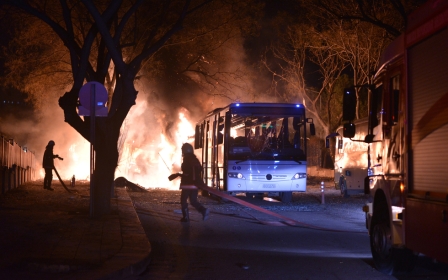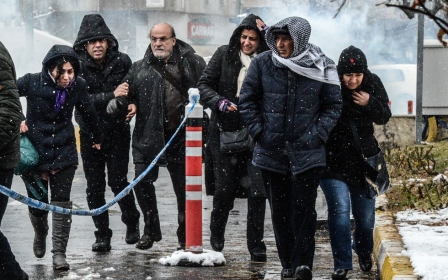Ankara attack a result of Turkey's 'sectarian policy': opposition

As Turkish government officials blamed Syrian Kurds for the Ankara bombing on Wednesday that killed 28, political opponents said the attack was a sign of an incoherent Syria policy moving in the wrong direction.
Hours after the attack which also wounded at least 61 people and left dramatic flames and flumes of smoke on Ankara’s skyline, Turkish Prime Minister Ahmet Davutoglu said on Thursday the attack was carried out by a Syrian connected to Syrian Kurds fighting near the Syrian-Turkish border.
"The attack has direct links with YPG,” said Davutoglu, referring to the military wing of the Syrian Kurdish Democratic Union Party (PYD). The PYD are supported by the Kurdish People’s Protection Unit’s (PKK), a group with which the Turkish government is at war after negotiations broke down last year.
Yasin Aktay, former deputy AKP chairman responsible for foreign affairs, echoed Davutoglu, telling Middle East Eye that it was “clear” who had perpetrated the attack and why.
“The PYD has become very unsettled by Turkey’s Syria policy and is seeking to impede it,” said Aktay, an MP representing Siirt.
“The PKK and the PYD are the same thing and even share the same militants. We have been saying this all along and this attack has just proven how right we are.”
Some Turks were quick to jump on the government's comments and call for action.
“We should catch these treacherous snakes and make them pay," said Mustafa Atay, a grocery store owner in Istanbul. "Our security forces should avenge every drop of spilled blood. Doesn’t matter who did it, we should find them and make them pay.”
“Our government has only looked to stop poor Syrian civilians from being killed," he added. "I have heard on TV many times that the PYD is trying to create its own area there with help from America. Our leaders should stand strong and not allow this.”
But others, like university student Cemile Demirtas, a Republican People’s Party (CHP) supporter, said she hoped the government would distance itself from the conflicts of the region.
“The government has dragged us into this mess just because of their ideological reasons. We have enough problems of our own. We don’t need to get involved in these games," Demirtas said. "Turkey should stay above these Middle Eastern issues.”
Syrian quagmire?
Two members of the pro-Kurdish Democratic Peoples’ Party (HDP) agreed that the attacks are related to Syria, but told MEE that they are symptomatic of Turkish strategy that has become a mess.
“We don’t know which organisation is behind this latest attack and the government’s attempts to immediately blame the PYD and YPG are unconvincing and simply appears to be an attempt to conceal its own shortcomings,” said Mithat Sancar, an MP representing Mardin, told MEE.
“The government hasn’t had a coherent Syria policy ever. First it backed all sorts of extreme fundamentalist groups, then it based its entire policy on opposing the PYD,” he said.
To ensure domestic stability and regional peace, he said, the government must let go of its battle with Syria’s Kurds and work with Kurdish groups inside Turkey.
Garo Paylan, an HDP MP representing Istanbul, said more concrete evidence was needed to know who was behind the bombing “although the government seems to consider the culprits as an open and shut case”.
“In general though such attacks are obviously a result of the sectarian policy adopted by Turkey in the region, particularly Syria,” Paylan told MEE.
“The Turkish government’s complete inability to comprehend the situation both domestically and in the region, and its unwillingness to accept the paradigm of pluralism is making Turkey more isolated each passing day and the target of so many attacks all over the country.”
Wider culpability
Other opposition politicians said the bombing shows wider failings of the AKP-led government - and one questioned whether the US, through its support of the YPG, was culpable.
“Where are the intelligence and security services and what are they doing while a bomb explodes in the heart of Ankara and the headquarters of the state?” Devlet Bahceli, leader of the Nationalist Movement Party (MHP) wrote on his Twitter account.
“Doesn’t the United States have a share in the spillage of blood after it arms the PYD/YPG and pushes them into action?” he asked.
Former CHP MP Sahin Mengu said if the attack was the work of the PYD, it showed that the government should realise that negotiating with the PKK “is a mistake”.
“It will always come back to bite you,” he told MEE. “The PYD is trying to make Turkey pay for Ankara’s position against it in Syria.”
Gulseren Tufekci, a housewife living in Istanbul, agreed that government should forget ever returning to negotiations and deal more firmly with the PKK.
"We will never have peace otherwise," she said.
“They [the government] kept on promising that mothers won’t cry anymore. What happened? We are crying more than ever before," she added.
Current CHP MP Ozgur Ozel said the country has been reduced to this state as a result of not holding authorities accountable.
“The president, all those who run the state, are responsible for this attack. That is the bottom line,” the Turkish newspaper Hurriyet quoted him as saying at a press conference in parliament on Thursday.
Suraj Sharma contributed to this piece.
New MEE newsletter: Jerusalem Dispatch
Sign up to get the latest insights and analysis on Israel-Palestine, alongside Turkey Unpacked and other MEE newsletters
Middle East Eye delivers independent and unrivalled coverage and analysis of the Middle East, North Africa and beyond. To learn more about republishing this content and the associated fees, please fill out this form. More about MEE can be found here.




